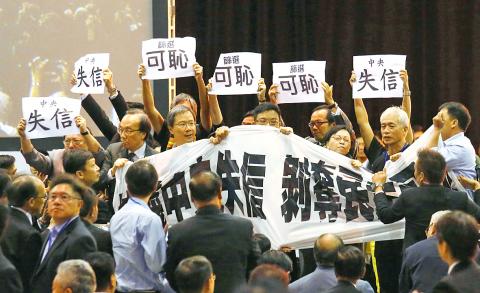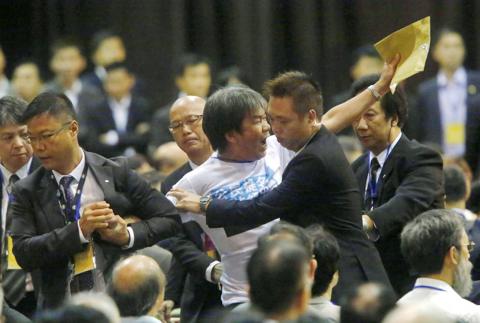Hong Kong pro-democracy activists yesterday heckled a top Chinese official, setting the stage for disruptive protests against the mainland’s landmark decision to limit voting reforms, but Beijing insisted that there would be no turning back.
Li Fei (李飛), deputy secretary-general of the Standing Committee of China’s National People’s Congress (NPC), was forced to speak over the cries of pro-democracy lawmakers and protesters during a meeting with local officials in the territory.
Brief scuffles erupted outside the venue as police used pepper spray to stop protesters from storming the hall, where Li told delegates that China would not tolerate a local leader who is disloyal to the mainland.

Photo: Reuters
“Anyone who does not love the country, love Hong Kong or is confrontational towards the central government shall not be the chief executive,” he said.
His visit came a day after democracy activists vowed an “era of civil disobedience,” including mass sit-ins at the territory’s financial district in response to Beijing’s decision to grant only limited reforms in the former British colony.
Democrat lawmakers said they would sink Beijing’s proposal when it comes before the territory’s Legislative Council early next year.

Photo: Reuters
“If it’s the same proposal decided by the NPC, we will vote against it,” Hong Kong Legislator Frederick Fung (馮檢基) said, adding that at least 25 of his colleagues have signed a declaration to shoot it down.
The proposal needs to win two-thirds support — or 47 votes — in the 70-seat legislature to pass.
For years, activists have agitated for the right to nominate candidates and to vote for Hong Kong’s leader, a campaign buoyed by a recent surge in discontent over rising inequality and perceived interference by Beijing. However, their hopes were dashed on Sunday.
The NPC Standing Committee announced that residents will be allowed to elect their next leader in 2017 — but candidates must be chosen by a pro-Beijing committee and must win the backing of more than half of the committee members to stand. Only two or three will be allowed to contest the election.
Democracy activists have called the restrictive framework a betrayal of Beijing’s promise to award Hong Kong universal suffrage by 2017 and say the nominating committee would ensure a sympathetic slate of candidates and exclude dissidents.
As Li approached the lectern to speak at the Asia World Expo convention center, veteran dissident Legislator Leung Kwok-hung (梁國雄) started shouting him down, his fist raised in the air. He was joined by a dozen pro-democracy lawmakers and some younger demonstrators who unfurled a banner and chanted: “The central government broke its promise, shameless.”
The meeting was briefly suspended while security officers removed the hecklers, to loud cheers and applause from pro-Beijing lawmakers.
Police confirmed they used pepper spray outside the venue when “protesters behaved violently.”
During an afternoon press conference Li criticized the pan-
democrats for heckling him.
“The door for dialogue has always been open, but this morning, it was they [the pan-democrats] who refused to communicate,” he said.
Li flew to Hong Kong from Beijing late on Sunday and was forced to drive past a crowd of largely student protesters gathered outside his hotel, in the kind of scenes that would be unthinkable on the mainland.
Following China’s decision to vet candidates, the pro-democracy group Occupy Central said on Sunday it would go ahead with its threat to take over the Central financial district in protest, at an unspecified date.
Shortly before Li’s speech activists launched what they described as a “slow drive” through the territory, the first of a string of promised small-scale civil disobedience acts.
About 10 cars, decked with flags, made their way deliberately slowly through the territory, accompanied by police motorcycles, but traffic was not noticeably disrupted.

The Taiwanese passport ranked 33rd in a global listing of passports by convenience this month, rising three places from last month’s ranking, but matching its position in January last year. The Henley Passport Index, an international ranking of passports by the number of designations its holder can travel to without a visa, showed that the Taiwan passport enables holders to travel to 139 countries and territories without a visa. Singapore’s passport was ranked the most powerful with visa-free access to 192 destinations out of 227, according to the index published on Tuesday by UK-based migration investment consultancy firm Henley and Partners. Japan’s and

NATIONAL SECURITY THREAT: An official said that Guan Guan’s comments had gone beyond the threshold of free speech, as she advocated for the destruction of the ROC China-born media influencer Guan Guan’s (關關) residency permit has been revoked for repeatedly posting pro-China content that threatens national security, the National Immigration Agency said yesterday. Guan Guan has said many controversial things in her videos posted to Douyin (抖音), including “the red flag will soon be painted all over Taiwan” and “Taiwan is an inseparable part of China,” while expressing hope for expedited “reunification.” The agency received multiple reports alleging that Guan Guan had advocated for armed reunification last year. After investigating, the agency last month issued a notice requiring her to appear and account for her actions. Guan Guan appeared as required,

Japan and the Philippines yesterday signed a defense pact that would allow the tax-free provision of ammunition, fuel, food and other necessities when their forces stage joint training to boost deterrence against China’s growing aggression in the region and to bolster their preparation for natural disasters. Japan has faced increasing political, trade and security tensions with China, which was angered by Japanese Prime Minister Sanae Takaichi’s remark that a Chinese attack on Taiwan would be a survival-threatening situation for Japan, triggering a military response. Japan and the Philippines have also had separate territorial conflicts with Beijing in the East and South China

A strong cold air mass is expected to arrive tonight, bringing a change in weather and a drop in temperature, the Central Weather Administration (CWA) said. The coldest time would be early on Thursday morning, with temperatures in some areas dipping as low as 8°C, it said. Daytime highs yesterday were 22°C to 24°C in northern and eastern Taiwan, and about 25°C to 28°C in the central and southern regions, it said. However, nighttime lows would dip to about 15°C to 16°C in central and northern Taiwan as well as the northeast, and 17°C to 19°C elsewhere, it said. Tropical Storm Nokaen, currently